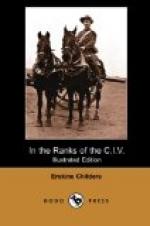August 5.—Reveille at five. Harnessed up; but some hitch ahead occurred, and we unhooked, watered, and grazed. Finally started about 8.30, and made a rapid march as advance guard, of about fourteen miles, with only momentary halts. Country very hilly; steep, squat, flat-topped kopjes and several bad drifts. We camped about 1.30 near five small houses in a row, with the novel accessory of some big trees—probably a town in large letters on the map. It appears the convoy has halted some way back for the four midday hours dear to the oxen. The rest of the column came in at dusk. A warm night. Every night in camp you may hear deep-throated choruses swelling up from the prisoners’ laager. The first time I heard it I was puzzled to know what they were singing; the tune was strangely familiar, but I could not fix it. It was not till the third night that I recognized the tune of “O God, our help,” but chanted so slowly as to be difficult to catch, with long, luxurious rests on the high notes, and mighty, booming crescendos. Coming from hundreds of voices, the effect was sometimes very fine. At other times smaller groups sang independently, and the result was a hideous noise. I wonder if the words correspond to our tune. If so, every night these prisoners, who have staked and lost all in a hopeless struggle, sing, “O God, our help in ages past.” This is faith indeed.
August 6.—Bank Holiday.—At 6.45 we started as advance-guard again, and marched for five and a half hours, with only a halt or two of a few minutes, to Senekal. The country gradually became flatter, the kopjes fewer and lower, till at last it was a great stretch of arid, dusty plain. It seemed quite strange to be driving on level ground, after endless hills and precipitous drifts. We and Brabant’s Horse were advance guard, and clattered down in a pall of blinding white dust into a substantial little tin-roofed town, many stores open, and people walking about in peace (the ladies all in black). Full of soldiers, of course, but still it was our first hint for months of peace and civilization, and seemed home-like. One of the first things I saw was a jar of Osborne biscuits in a window, and it gave me a strange thrill! The convoy and prisoners follow this evening. The column is miles long, as besides our own transport, there are all the Boer waggons, long red ones, each with some prisoners on it and a soldier. Also scores of Cape carts, with a fat farmer in each. There was a wild rush for provisions in the town by our orderlies and Brabant’s. They got bread, and I bought some eggs and jam on commission. After camping and unharnessing, I had a good wash in the river, an orange-coloured puddle. I wonder how it is that by some fatality there is always a dead quadruped, mule, horse, or bullock, near our washing places. We don’t mind them on the march; they are dotted along every road in South Africa now, I should think; but when making a refreshing




